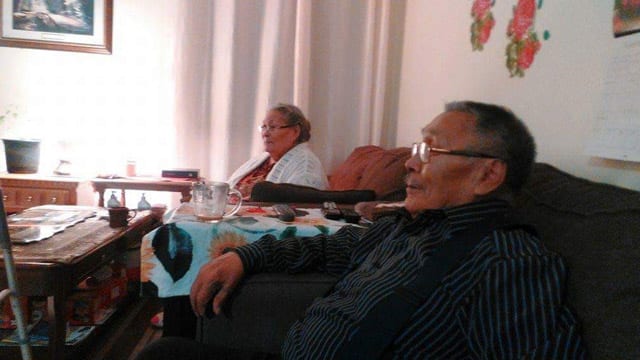(Iqaluit has a population of about 7,000 – and a vacancy rate of 5 per cent. Unless you work for the federal government, and at times the government of Nunavut, finding a place to live can be a challenge.)
Kathleen Martens
Holly Moore
APTN Investigates
Walking into Aimo and Koonoo Muckpaloo’s neat, one-bedroom apartment, you would never guess there are eight people living there.
But the mattresses jammed up against the fridge and the colourful bedding stacked in the hall are a dead giveaway.
The couple lives in the only seniors’ apartment complex in Iqaluit with their son, his wife and their four children.
The son’s family lives in a tiny storage closet during the day and drags out mattresses every night to sleep on the living room floor.
They spoke to APTN Investigates’ reporter Kathleen Martens through their daughter, Aglak Muckpaloo who translated their Inuktitut answers into English.
Martens and producer Holly Moore travelled to Nunavut this past winter working on #ARTICLE 23, an episode airing Friday Feb. 3 at 6:30 p.m. ET.

“It’s very hard for them,” the daughter said. “She (Koono) is going through a lot in this house, there are eight of them living here.”
Their son and his wife are both employed, and they’d been living in a tent for months before they moved in almost four years ago.
Koono said they have been on the waiting list for affordable, social housing since then. They just can’t afford Iqaluit’s sky-high rents.
“It was hard for her to see them when they were living in the tent,” the daughter said. “When my parents moved here, she let them move in.”
She added their situation is common and other Elders in the complex also live with multiple family members.
The Muckapaloos were settled in Arctic Bay by the federal government — one of the 25 communities that make up Nunavut. They’ve been together since 1955 and remember the old way of living on the land before Inuit were colonized.
Aimo said he worked for the RCMP back then as the community’s dog-catcher and killer. He said he was told the dogs were not healthy for the people.
“They were told not to have dog teams anymore and the RCMP told him to shoot the dogs,” his daughter said. “Even his own relatives’ dogs. He had no choice.”
Koono’s daughter said her mother had hoped that when Nunavut become a territory in 1999, the government would help Inuit people with homelessness and the mental illnesses that come with it.
“They aren’t doing anything,” she said. “She doesn’t know where they can get help.”
For now, they live in a cramped space in the city, far from the limitless tundra they used to know.
“They were told they would be living in houses if they came in off the land,” their daughter said. “They had to change their life.”













And Trudeau continues to spend billions on immigrants. I am ashamed of this government of Canada.